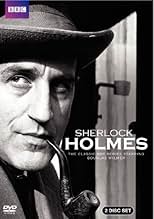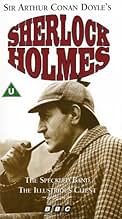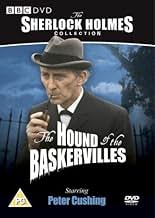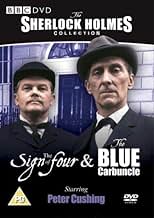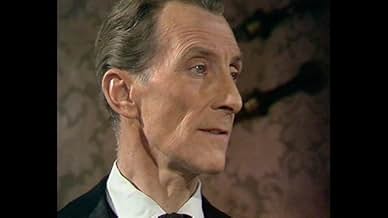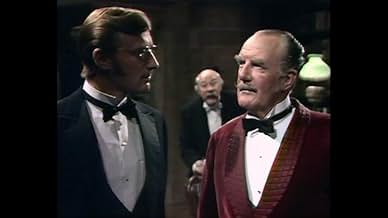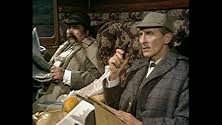Ajouter une intrigue dans votre langueA series of Sherlock Holmes adaptations, based on the stories of Sir Arthur Conan Doyle.A series of Sherlock Holmes adaptations, based on the stories of Sir Arthur Conan Doyle.A series of Sherlock Holmes adaptations, based on the stories of Sir Arthur Conan Doyle.
Parcourir les épisodes
Avis à la une
The BBC made two Sherlock Holmes series in the 1960's. The first was shot in black and white starred Douglas Wilmer. The second was made in colour and starred peter Cushing. In both series they were ably supported by Nigel Stock as Dr Watson. Both series closely followed Conan Doyle's original stories and made with the period atmosphere the BBC is renowned for. In the first series Wilmer makes a terrific Holmes arrogant, witty, sardonic, and with a mischievous charm. He also looks the part and has the perfect voice for the role. Nigel Stock is great as Watson and has the right chemistry with both actors. Cushing who had already excelled in the hammer version of the hound is excellent as ever working hard to make sure that every bit of his characterisation matched that what Doyle had intended.
Here is an ambitious early effort by the BBC to bring Holmes to the small screen, in faithful live adaptations of the original stories. The 1964-5 series of thirteen programs starred a surprisingly capable Douglas Wilmer, who reads Holmes as brilliant (of course), lofty, bland, and a trace condescending--it is a well-crafted portrayal. Mr Wilmer seems to have been a Holmes devotee, and picked up several other related shows in his later years, including his last acting appearance as an irate member of the Diogenes club, in 2012. His devotion to this production reportedly included deep uncredited script rewrites--whoever is responsible for these teleplays did a very commendable job.
The 1968 series of sixteen episodes, of which unhappily only five survive, went to Peter Cushing. He provides us a typically brilliant, mercurial, skillful interpretation though with no new personality traits of the character. He is quite a showman, however, and easily captures the camera and propels the stories along. Both these great actors had difficulty with the confines of live, serial British television of the 1960's. The production, while very skillfully made, looks pretty inexpensive and generally lacking in retakes. Clearly rehearsals were hurried as well.
So, recommended for Holmes scholars; most people, fast-forward to the Granada series of the 1980's and 90's.
The 1968 series of sixteen episodes, of which unhappily only five survive, went to Peter Cushing. He provides us a typically brilliant, mercurial, skillful interpretation though with no new personality traits of the character. He is quite a showman, however, and easily captures the camera and propels the stories along. Both these great actors had difficulty with the confines of live, serial British television of the 1960's. The production, while very skillfully made, looks pretty inexpensive and generally lacking in retakes. Clearly rehearsals were hurried as well.
So, recommended for Holmes scholars; most people, fast-forward to the Granada series of the 1980's and 90's.
The cases of the infamous Baker Street sleuth, Sherlock Holmes, and his loyal companion Dr Watson.
A careful and occasionally engaging series, but despite stellar casts, the acting was at times variable and the direction often tended to be stagy in a stodgy theatrical way typical of BBC programmes at that time. Peter Cushing replaced Douglas Wilmer as Holmes in 1968 and he gave a cracking performance in Hammer's "The Hound Of The Baskervilles" (1959 - see my review), but occasionally his talents didn't quite shine here.
I recently picked up the BBC's three DVD set entitled "The Sherlock Holmes Collection", featuring five episodes. My favourites are "The Blue Carbunkle" and "The Boscombe Valley Mystery". It is avaliable at £19.99 in good music and video stores.
A careful and occasionally engaging series, but despite stellar casts, the acting was at times variable and the direction often tended to be stagy in a stodgy theatrical way typical of BBC programmes at that time. Peter Cushing replaced Douglas Wilmer as Holmes in 1968 and he gave a cracking performance in Hammer's "The Hound Of The Baskervilles" (1959 - see my review), but occasionally his talents didn't quite shine here.
I recently picked up the BBC's three DVD set entitled "The Sherlock Holmes Collection", featuring five episodes. My favourites are "The Blue Carbunkle" and "The Boscombe Valley Mystery". It is avaliable at £19.99 in good music and video stores.
The 2 part episode Hound of the Baskervilles from the BBC TV series originally shown on 07/14.07.68 is out on DVD and video, and upon watching proves to me my memory isn't failing ... yet. Although, I wouldn't have guessed it was in colour and is still as bright as a new penny, both in texture and production values (bearing in mind the financial pressures always on the BBC). Peter Cushing and Nigel Stock play their parts of Holmes and Watson in a convincing way, although Cushing reportedly didn't enjoy the experience of little rehearsal time available.
The story should be familiar to most but this time it's closer to the book than the other film versions I've seen. Some 1960's stagey BBC acting from time to time and no money available for certain shots so a few ho hum short cuts to be sure, but still resulting a fine and satisfying TV programme. My daughter wasn't keen on the sudden ending but - they were Arty back then!
Thank the Heavens they didn't wipe it!
The story should be familiar to most but this time it's closer to the book than the other film versions I've seen. Some 1960's stagey BBC acting from time to time and no money available for certain shots so a few ho hum short cuts to be sure, but still resulting a fine and satisfying TV programme. My daughter wasn't keen on the sudden ending but - they were Arty back then!
Thank the Heavens they didn't wipe it!
This adaptation of the most famous fictional detective - Sherlock Holmes - succeeds in being the first authentic series that is accurately based upon the Holmes character, Watson's character and the stories themselves.
However, it is well documented that this series wasn't without its problems behind the scenes.
The leading actor from the 1964/65 series - Douglas Wilmer - recalled in a recent interview before his passing - that he took it upon himself to re-write all the dialogue. The reason for this, was because no one at the BBC had bothered to read the original stories whilst writing the scripts, according to the late actor.
Angry with the writers of the series and perhaps with some justification, Douglas Wilmer believed here was a golden opportunity in making an authentic Sherlock Holmes television series.
The BBC didn't react very well to what the actor did and so, he was labelled a "troublemaker."
The atmosphere during the making of the series was rather fraught with tension.
In spite of the above, I am delighted with the final results. The existing black and white episodes offer moments of TV joy. All of them work tremendously well. Even though the production values are on the modest side (typical bloody BBC), great lengths have been taken in recreating Victorian London.
Upon discovering that rehearsal time was being reduced from once every 14 days to every 10 days, it proved to be the final straw. Douglas Wilmer announced his decision to leave the series.
I found that to be a great shame as he easily ranks as being one of the definitive interpretations of Sherlock Holmes (Basil Rathbone is still my favourite). As was pointed out, the various characteristics of Holmes were presented for the first time and not always positive ones. I own the black and white series on DVD and it's a welcome release.
When the series returned in 1968 and in colour, 16 further episodes were commissioned for production.
Nigel Stock returned as Doctor Watson and was joined by Peter Cushing who assumed the role of the Baker Street sleuth. The latter made for a very effective Holmes - albeit a totally different one to that of his predecessor. The less pleasant aspects of Holmes were effectively toned down.
Peter Cushing never was very keen on watching himself as Holmes, as he felt the lack of rehearsal time hampered his chance of creating a properly studied performance. He does do very well though.
It is nothing short of a travesty that only 6 of the colour episodes exist. The chances of any others being recovered, are fairly remote. However, the 2 part version of "The Hound of the Baskervilles" has been preserved and thank goodness! It is an excellent rendition and far superior to the Jeremy Brett version.
Anyone who is a fan of Sherlock Holmes should aquire these BBC gems.
Le saviez-vous
- AnecdotesDouglas Wilmer was infuriated when he first received some of the scripts for the series. He said that the dialogue ranged from being acceptable to downright deplorable. As a result, the actor spent many hours into the night at home, re-typing most of the scripts. The actor stated that the officially credited writers, hadn't bothered to carry out their research, regarding the Holmes stories in general.
- ConnexionsFeatured in Peter Cushing: A One-Way Ticket to Hollywood (1989)
- Bandes originalesAim and Endeavour
(uncredited)
Composed by Trevor Duncan
Performed by The New Concert Orchestra
[series theme tune]
Meilleurs choix
Connectez-vous pour évaluer et suivre la liste de favoris afin de recevoir des recommandations personnalisées
- How many seasons does Sherlock Holmes have?Alimenté par Alexa
Détails
- Date de sortie
- Pays d’origine
- Langue
- Aussi connu sous le nom de
- Шерлок Голмс
- Lieux de tournage
- Société de production
- Voir plus de crédits d'entreprise sur IMDbPro
- Durée50 minutes
- Couleur
- Mixage
- Rapport de forme
- 1.33 : 1
Contribuer à cette page
Suggérer une modification ou ajouter du contenu manquant


